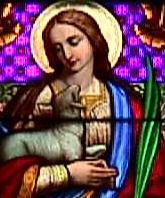
Daily Readings for:January 21, 2014
(Readings on USCCB website)
Collect: Almighty ever-living God, who choose what is weak in the world to confound the strong, mercifully grant, that we, who celebrate the heavenly birthday of your Martyr Saint Agnes, may follow her constancy in the faith. Through our Lord Jesus Christ, your Son, who lives and reigns with you in the unity of the Holy Spirit, one God, for ever and ever.
RECIPES
ACTIVITIES
o Celebration for the Feast of St. Agnes
o Customs on the Feast of St. Agnes
PRAYERS
o Octave of Prayer for Christian Unity
LIBRARY
o The Role of the Woman in the Life of the Church | Fides Dossier
· Ordinary Time: January 21st
· Memorial of St. Agnes, virgin and martyr
Old Calendar: St. Agnes
St. Agnes (c. 304) like St. Cecilia, is to be numbered among the most famous martyrs of Rome. When the Diocletian persecution was at its height, and when priests as well as laymen were apostatizing from the faith, Agnes, a girl of twelve, freely chose to die for Christ. When she was commanded to offer incense to false gods, she raised her hand to Christ and made the Sign of the Cross. When the heathens threatened to bind her hand and foot, she herself hastened to the place of torture as a bride to her wedding feast. Pain had no terror for her—although the fetters slipped from her small hands while even the pagan bystanders were moved to tears.
When the son of the Roman prefect offered to marry her, she replied: "The one to whom I am betrothed is Christ Whom the angels serve." When the executioner, who was to behead her, hesitated, she encouraged him with the words: "Strike, without fear, for the bride does her Spouse an injury if she makes Him wait". The name of "Agnes" means "lamb-life," and hence the lamb is the symbol of the modesty and innocence of the virgin-martyr.
The Week of Prayer for Christian Unity
St. Agnes
Agnes is one of the most glorious saints in the calendar of the Roman Church. The greatest Church Fathers vie with one another in sounding her praise and glory. St. Jerome writes: "All nations, especially their Christian communities, praise in word and writing the life of St. Agnes. She triumphed over her tender age as well as over the merciless tyrant. To the crown of spotless innocence she added the glory of martyrdom."
Our saint's name should be traced to the Greek hagne - the pure, rather than to the Latin agna - lamb. But the Latin derivation prevailed in the early Church. The reason may have been that eight days after her death Agnes appeared to her parents with a train of virgins, and a lamb at her side. St. Augustine knew both derivations. "Agnes", he writes, "means 'lamb' in Latin, but in Greek it denotes 'the pure one'". The Latin interpretation occasioned the yearly blessing of the St. Agnes lambs; it takes place on this day in the Church of which she is patron, and the wool is used in weaving the palliums worn by archbishops and, through privilege, by some bishops. In the church built by the Emperor Constantine over the saint's grave, Pope Gregory the Great preached a number of homilies. Reliable details concerning the life of St. Agnes are very few. The oldest material occurs in St. Ambrose's De Virginibus, parts of which are read today at Matins. The value of the later (definitely unauthentic) "Passion" of the saint is enhanced by the fact that various antiphons and responsories in the Office are derived from it.

From such liturgical sources we may construct the following "life of St. Agnes". One day when Agnes, then thirteen years old, was returning home from school, she happened to meet Symphronius, a son of the city prefect. At once he became passionately attracted to her and tried to win her by precious gifts. Agnes repelled him, saying: "Away from me, food of death, for I have already found another lover" (r. Ant.). "With His ring my Lord Jesus Christ has betrothed me, and He has adorned me with the bridal crown" (3. Ant., Lauds). "My right hand and my neck He has encircled with precious stones, and has given me earrings with priceless pearls; He has decked me with lovely, glittering gems" (2. Ant.). "The Lord has clothed me with a robe of gold, He has adorned me with priceless jewels" (4. Ant.). "Honey and milk have I received from His mouth, and His blood has reddened my cheeks" (5. Ant.). "I love Christ, into whose chamber I shall enter, whose Mother is a virgin, whose Father knows not woman, whose music and melody are sweet to my ears. When I love Him, I remain chaste; when I touch Him, I remain pure; when I possess Him, I remain a virgin" (2. Resp.). "I am betrothed to Him whom the angels serve, whose beauty the sun and moon admire" (9. Ant.). "For Him alone I keep my troth, to Him I surrender with all my heart" (6. Ant.).
Incensed by her rebuff, Symphronius denounced Agnes to his father, the city prefect. When he threatened her with commitment to a house of ill fame, Agnes replied: "At my side I have a protector of my body, an angel of the Lord" (2. Ant., Lauds). "When Agnes entered the house of shame, she found an angel of the Lord ready to protect her" (1. Ant., Lauds). A light enveloped her and blinded all who tried to approach. Then another judge condemned her to the stake because the pagan priests accused her of sorcery.

Surrounded by flames she prayed with outstretched arms: "I beseech You, Father almighty, most worthy of awe and adoration. Through Your most holy Son I escaped the threats of the impious tyrant and passed through Satan's filth with feet unsullied. Behold, I now come to You, whom I have loved, whom I have sought, whom I have always desired." She gave thanks as follows: "O You, the almighty One, who must be adored, worshipped, feared - I praise You because through Your only begotten Son I have escaped the threats of wicked men and have walked through the filth of sin with feet unsullied. I extol You with my lips, and I desire You with all my heart and strength."
After the flames died out, she continued: "I praise You, Father of my Lord Jesus Christ, because by Your Son the fire around me was extinguished" (4. Ant., Lauds). And now she longed for union with Christ: "Behold, what I yearned for, I already see; what I hoped for, I already hold in embrace; with Him I am united in heaven whom on earth I loved with all my heart" (Ben. Ant.). Her wish was granted; the judge ordered her beheaded. —The Church's Year of Grace, Pius Parsch
Patron: Affianced couples; betrothed couples; bodily purity; chastity; Children of Mary; Colegio Capranica of Rome; crops; engaged couples; gardeners; Girl Scouts; girls; rape victims; diocese of Rockville Centre, New York; virgins.
Symbols: Lamb; woman with long hair and a lamb, sometimes with a sword at her throat; woman with a dove which holds a ring in its beak; woman with a lamb at her side.
Things to Do:
- Read St. Ambrose's De Virginibus about the martyrdom of St. Agnes. "It is the birthday of a martyr, let us offer the victim. It is the birthday of St. Agnes, let men admire, let children take courage, let the married be astounded, let the unmarried take an example."
The Week of Prayer for Christian Unity
Day Four: Together... we affirm that God is faithful
The eternal unity of Father, Son and Spirit draws us closer into the love of God, and calls us to participate in God’s work in the world which is love, mercy and justice. Mercy and justice are not divided in God, but rather are joined together in the steadfast love manifested in God’s covenant with us and with all of creation.
The new father Zechariah testifies to God’s manifestation of mercy in keeping his promises to Abraham and his descendents. God is faithful to his holy covenant.
As we continue to pray for the unity of the church, we must not neglect to meet together and encourage one another, spurring each other on towards love and good deeds, saying: "God is faithful."